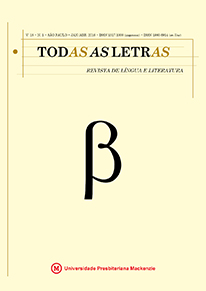Formation of Lusophone subject:
an analytic exercise in songs
Resumo
In this article we present research results that contrast the Lusophone feeling in Brazil and in Portugal concerning to written representations in which are observed cultural-linguistic issues. For doing so, basing on Discourse Analysis procedures, Portuguese and Brazilian authors were studied, represen-tative from the second half of the 20th century, as lyric producers that dialog among them in what concerns to formation of Lusophone subjects
Downloads
Referências
BAKHTIN, M. Marxismo e filosofia da linguagem. São Paulo: Hucitec, 2002.
BASTOS, N. B.; BRITO, R. P. de. Lusofonia: políticas linguísticas e questões identitárias. In: MARTINS, M. L.; SOUSA, H.; CABECINHAS, R. (Org.). Comuni-cação e lusofonia: para uma abordagem crítica da cultura e dos media. Porto: Campo das Letras; Universidade do Minho, 2006. p. 111-122.
BASTOS FILHO, F. V.; BASTOS, N. M. O.; BRITO, R. P. de. Comunicação inter-cultural: vínculos na lusofonia. São Paulo: Terracota, 2014.
BRITO, R. P. de. Temas para a compreensão do atual quadro linguístico de Ti-mor-Leste. Ciências & Letras, Porto Alegre, n. 48, p. 175-194, jul./dez. 2010. Disponível em: <http://seer3.fapa.com.br/index.php/arquivos/article/view/ 55/50>. Acesso em 6 maio 2016.
BRITO, R. P. de. Língua e identidade no universo da lusofonia. Aspectos de Ti-mor-Leste e Moçambique. São Paulo: Terracota, 2013.
BRITO, R. P. de; BASTOS, N. B. Dimensão semântica e perspectivas do real: comentários em torno do conceito de lusofonia. In: MARTINS, M. L.; SOUSA, H.; CABECINHAS, R. (Org.). Comunicação e lusofonia: para uma abordagem crítica da cultura e dos media. Porto: Campo das Letras; Universidade do Minho, 2006. p. 65-78.
BUESCU, M. L. C. Aspectos da herança clássica na cultura portuguesa.Lisboa: Icalp – Ministério da Educação, 1992.FIORIN, J. L. Linguagem e ideologia. São Paulo: Ática, 1995.FIORIN, J. L. A lusofonia como espaço linguístico. In: BASTOS, N. M. (Org.). Língua Portuguesa: reflexões lusófonas. São Paulo: Educ, 2006. p. 25-47.
GOMES DE MATOS, F. Como explicar variantes de uso no português? Um de-safio descritivo-prescritivo. Confluência – Revista do Instituto de Língua Portu-guesa, Rio de Janeiro, n. 21, p. 93-96, 2001. LOURENÇO, E. A nau de Ícaro. São Paulo: Cia. das Letras, 2001.
MAINGUENEAU, D. Novas tendências em análise do discurso. Campinas: Pon-tes, 1997.MARTINS, M. de L. O ponto de vista argumentativo da comunicação. In: CON-GRESSO LUSOCOM, 2., 1998, Aracaju. Aracaju: Universidade Federal de Ser-gipe, Aracaju, 1998. Disponível em: <http://repositorium.sdum.uminho.pt/handle/1822/25356>. Acesso em: 6 abr. 2015.
MARTINS, M. de L. Lusofonia e luso-tropicalismo, equívocos e possibilidades de dois conceitos hiper-identitários. In: BASTOS, N. M. (Org.). Língua Portuguesa: reflexões lusófonas. São Paulo: Educ, 2006. p. 49-62.
SOUSA, H. Os media ao serviço do imaginário: uma reflexão sobre a RTP Inter-nacional e a Lusofonia. Comunicação e Sociedade 2 – Cadernos do Noroeste, Série Comunicação, Braga, v. 14, n. 1-2, p. 305-317, 2000.
Downloads
Publicado
Como Citar
Edição
Seção
Licença
Copyright (c) 2016 Todas as Letras - Revista de Língua e Literatura

Este trabalho está licenciado sob uma licença Creative Commons Attribution-NonCommercial 4.0 International License.
Os direitos autorais dos artigos publicados na Todas as Letras pertencem aos autores, que concedem à Universidade Presbiteriana Mackenzie os direitos exclusivos de publicação do conteúdo. É vedada sua reprodução total ou parcial sem a devida autorização da Comissão Editorial, exceto para estudo e pesquisa.




